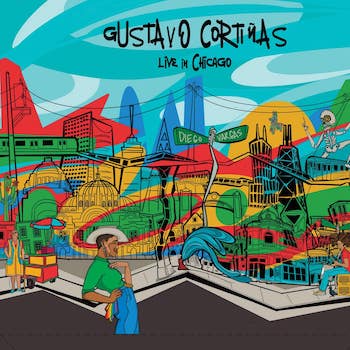Jazz Album Review: Gustavo Cortiñas’s “Live in Chicago” — The Culmination of a Decade’s Worth of Music
By Brooks Geiken
Throughout this superb live album, percussionist Gustavo Cortiñas allows his fellow band members an enormous amount of space, and that is welcome because of their high level of musicianship.

Cover artwork by Sam Kirk
Three years after his sprawling album Desafío Candente (Burning Challenge), composer and drummer Gustavo Cortiñas has returned with another powerful two-disc set, Live in Chicago. Born and raised in Mexico City, Cortiñas graduated with honors from New Orleans’s Loyola University and moved to Chicago in 2011 to pursue his Masters at Northwestern University. Cortiñas continues on his musical journey with his long-standing sextet; this recording appears to be the culmination of a decade’s worth of tunes with the same group members. This kind of stability is unusual in the jazz world, where musicians continually move on and start other bands.
The first disc presents the first set, which was recorded at Constellation, a performing arts nightclub in Chicago, on a December evening in 2022.
Cortiñas and band, featuring Drew Hanson (trumpet), Artie Black (tenor sax), Matthew Davis (trombone), Joaquin García (piano) and Kitt Lyles (bass), play each selection with impressive knowledge and savvy precision. Ensemble passages are warm and inviting; the rhythm section, led by Cortiñas’s drumming, supplies the band with a flowing foundation.
As master of ceremonies, Cortiñas introduces each song, providing pertinent information that enhances listening to the music. México is never far away: Cortiñas titled many songs in Spanish and draws on a variety of rhythms from his homeland. But make no mistake; both discs are brilliant jazz recordings, filled with dazzling solos and improvisations.
In terms of programming, Cortiñas picked many of the songs found on his last few albums. The idea was to spotlight the spontaneity of performance that can only be gotten in a live setting. A number of the tracks here deal with a rejection of colonization and imperialism, a concern at the heart of Desafío Candente. “Overture” opens the first disc — at nine minutes it is one of the album’s shorter musical offerings. Described as a simple blues, “Hanaki” embraces a number of intricate twists and turns — clocking in at 14 provocative minutes.
In addition to being a superb drummer, Cortiñas is a very thoughtful man. His introductions not only describe the music, but articulate what inspired him to make it. “Wish I Could Be There Now” is dedicated to a friend of Cortiñas’s whose father died in México via an act of gun violence. Black’s tenor sax and Davis’s trombone imbue “Wish I Could Be There Now” with an affecting sense of longing and sadness. “Arete” (Earring) harkens back to Cortiñas’s homeland. In the case of this distinctive fusion, he has reharmonized the folk song “Cielito Lindo” and drawn on the “Huapango” rhythm.
The second disc (the evening’s second set) kicks off with “Dialectics of Freedom.” Cortiñas offers an interesting explanation of the tune’s title. It is a direct quote from the German philosopher Hegel: the piece deals with how we human beings are always trying to reach some sort of freedom, but never quite getting there.
As a nod to the upright bass player, Lyles opens up “The Man of Flesh and Bone” with a two-minute solo. Cortiñas allows his fellow band members an enormous amount of space, and that is welcome because of their high level of musicianship. Each musician takes care to press their expertise to the max during their solo turns. Thus Lyles brings his resonant deep sound to bear as the song moves along to a slow arching pattern.
The most compelling song title here is “La Ruta de Regreso a Guinea Está en el Arcoíris” (The Route to Guinea Is in the Rainbow). Cortiñas explains that the song focuses on African culture, which, despite all the barriers and racism in America, has managed to survive and thrive.
“Pax Britannica” from Cortiñas’s opus Desafío Candente closes the second set with an introduction by the trumpeter Hanson is followed by a long piano solo where García shows his formidable command of 88 keys.
Throughout Live in Chicago, Cortiñas and band revel in a live setting. They not only demonstrate their intimate knowledge of the compositions, but express their evident joy at melding their musical skills with Cortiñas’s continuing commitment to encouraging social change through music.
Brooks Geiken is a retired Spanish teacher with a lifelong interest in music, specifically Afro-Cuban, Brazilian, and Black American music. His wife thinks he should write a book titled “The White Dude’s Guide to Afro-Cuban and Jazz Music.” Brooks lives in the San Francisco Bay Area.
Tagged: "Live in Chicago", and Kitt Lyles, Artie Black, Drew Hanson (trumpet), Gustavo Cortiñas, Joaquin García

I’m so glad this was a two-disc set. I wish now it had been three. Excellent album from every angle!